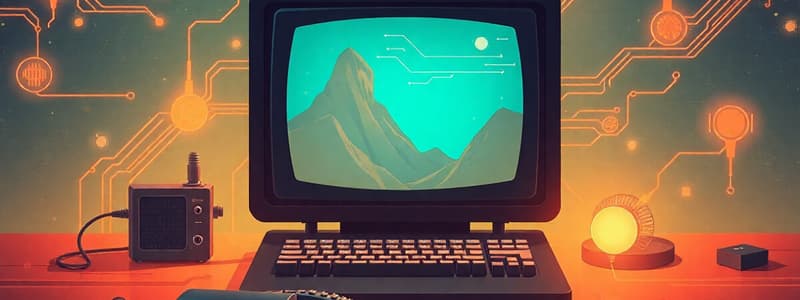Podcast
Questions and Answers
किस प्रकार के कंप्यूटर विशेष उद्देश्यों के लिए विकसित किए गए हैं?
किस प्रकार के कंप्यूटर विशेष उद्देश्यों के लिए विकसित किए गए हैं?
- सर्वर और डेस्कटॉप कंप्यूटर
- सुपरकंप्यूटर और एम्बेडेड सिस्टम (correct)
- लैपटॉप और टैबलेट
- स्मार्टफोन और गेमिंग कंसोल
क्वांटम कंप्यूटिंग की विशेषता क्या है?
क्वांटम कंप्यूटिंग की विशेषता क्या है?
- यह डेटा प्रोसेसिंग के लिए क्वांटम यांत्रिकी के सिद्धांतों का उपयोग करता है (correct)
- यह केवल छोटे डेटा सेट के लिए उपयोगी है
- यह इंटरनेट पर आधारित है
- यह पारंपरिक कंप्यूटरों की तुलना में जलवायु परिवर्तन पर ध्यान केंद्रित करता है
क्लाउड कंप्यूटिंग की किन विशेषताओं में से एक है?
क्लाउड कंप्यूटिंग की किन विशेषताओं में से एक है?
- यह केवल सॉफ्टवेयर सेवाएं प्रदान करती है
- यह केवल ऑफलाइन डेटा स्टोरेज प्रदान करती है
- यह केवल सुरक्षा समस्याओं को हल करती है
- यह भौगोलिक सीमाओं के पार सहयोग और पहुंच को आसान बनाती है (correct)
कौन सा विकल्प सुपरकंप्यूटर के उपयोग को गलत तरीके से दर्शाता है?
कौन सा विकल्प सुपरकंप्यूटर के उपयोग को गलत तरीके से दर्शाता है?
क्वांटम कंप्यूटिंग का वर्तमान स्थिति क्या है?
क्वांटम कंप्यूटिंग का वर्तमान स्थिति क्या है?
किस उपकरण ने व्यक्तिपरक कंप्यूटर के विकास में मदद की?
किस उपकरण ने व्यक्तिपरक कंप्यूटर के विकास में मदद की?
मोअर के कानून का क्या मुख्य निष्कर्ष है?
मोअर के कानून का क्या मुख्य निष्कर्ष है?
किसी कंप्यूटर के आकार और रूप के विकास में किसका योगदान महत्वपूर्ण है?
किसी कंप्यूटर के आकार और रूप के विकास में किसका योगदान महत्वपूर्ण है?
किस उपकरण ने गणनाओं के लिए भौतिक वस्तुओं के संचालन पर निर्भर किया?
किस उपकरण ने गणनाओं के लिए भौतिक वस्तुओं के संचालन पर निर्भर किया?
ट्रांजिस्टर के आविष्कार ने किस तरह के कंप्यूटर्स का मार्ग प्रशस्त किया?
ट्रांजिस्टर के आविष्कार ने किस तरह के कंप्यूटर्स का मार्ग प्रशस्त किया?
कंप्यूटर आर्किटेक्चर के विकास में क्या महत्वपूर्ण था?
कंप्यूटर आर्किटेक्चर के विकास में क्या महत्वपूर्ण था?
इंटीग्रेटेड सर्किट की विशेषता क्या है?
इंटीग्रेटेड सर्किट की विशेषता क्या है?
Flashcards
विशिष्ट कंप्यूटर
विशिष्ट कंप्यूटर
विशिष्ट उद्देश्यों के लिए डिज़ाइन किए गए कंप्यूटर, जैसे कि वैज्ञानिक सिमुलेशन के लिए सुपर कंप्यूटर और मशीनरी को नियंत्रित करने के लिए एम्बेडेड सिस्टम
सुपर कंप्यूटर
सुपर कंप्यूटर
अत्यधिक शक्तिशाली कंप्यूटर जो विशाल प्रसंस्करण क्षमता की आवश्यकता वाले कार्यों के लिए उपयोग किए जाते हैं
एम्बेडेड सिस्टम
एम्बेडेड सिस्टम
माइक्रोप्रोसेसर-आधारित सिस्टम जो उपकरणों, जैसे उपकरणों और ऑटोमोबाइल में बनाए जाते हैं
क्वांटम कंप्यूटिंग
क्वांटम कंप्यूटिंग
Signup and view all the flashcards
क्लाउड कंप्यूटिंग
क्लाउड कंप्यूटिंग
Signup and view all the flashcards
प्रारंभिक कंप्यूटिंग उपकरण
प्रारंभिक कंप्यूटिंग उपकरण
Signup and view all the flashcards
ट्रांजिस्टर क्रांति
ट्रांजिस्टर क्रांति
Signup and view all the flashcards
इंटीग्रेटेड सर्किट
इंटीग्रेटेड सर्किट
Signup and view all the flashcards
माइक्रोप्रोसेसर
माइक्रोप्रोसेसर
Signup and view all the flashcards
कंप्यूटर आर्किटेक्चर का विकास
कंप्यूटर आर्किटेक्चर का विकास
Signup and view all the flashcards
मूर का नियम
मूर का नियम
Signup and view all the flashcards
सॉफ़्टवेयर विकास का प्रभाव
सॉफ़्टवेयर विकास का प्रभाव
Signup and view all the flashcards
Study Notes
Early Computing Devices
- Before modern electronic computers, mechanical and electromechanical devices were used for calculations.
- Examples include the abacus, slide rule, and the difference engine (designed by Charles Babbage).
- These devices relied on physical manipulation of objects or gears to perform calculations.
- The concept of programmability was introduced through these early devices, paving the way for later advancements.
The Transistor Revolution
- The invention of the transistor in the mid-20th century marked a major turning point.
- Transistors replaced bulky vacuum tubes, enabling smaller, faster, and more reliable computers.
- This shift led to decreased power consumption and increased processing speed.
The Integrated Circuit
- The integrated circuit (IC), also known as the microchip, revolutionized computer design in the late 20th century.
- An integrated circuit combines multiple transistors, diodes, and resistors on a single piece of semiconductor material.
- This miniaturization allowed for even more complex and powerful computers.
Microprocessors
- Modern computers are built around a microprocessor, a single integrated circuit that contains all the central processing unit (CPU) functions.
- These microprocessors drive the performance and capabilities of modern computers.
- The combination of advanced transistors and microchips enabled the creation of personal computers.
Evolution of Computer Architecture
- From bulky mainframe computers to personal workstations, the size and form factor of computers evolved dramatically.
- The development of specialized components like graphics cards and network interfaces expanded the capabilities of these machines.
- This evolution reflects increasing demand for computing power and user-friendly interfaces.
Moore's Law
- Moore's Law predicts that the number of transistors on a microchip doubles approximately every two years.
- This ongoing trend of ever-increasing transistor density drives continual improvements in computing performance and capabilities.
- Moore's Law has largely held true for several decades, although the rate of improvement is slowing down.
Impact of Software Development
- Advancements in software development have been crucial to the progression of computers.
- Operating systems, application software, and programming languages make computers usable for a wide range of tasks.
- Constant innovation in software design fuels the evolution of computers through enabling new applications and functions.
Specialized Computing
- Specialized computers have been developed for specific purposes, such as supercomputers for scientific simulations and embedded systems for controlling machinery.
- Supercomputers are extremely powerful computers used for tasks requiring a huge processing capacity.
- Embedded systems are microprocessor-based systems built into devices like appliances and automobiles.
Quantum Computing
- Quantum computing is a rapidly evolving field.
- It harnesses principles of quantum mechanics for data processing, offering potential to solve complex problems that are intractable for traditional computers.
- Quantum computing is still in its early stages and faces many technological challenges.
Cloud Computing
- Cloud computing provides access to computing resources (hardware and software) over the internet.
- Cloud services encompass a variety of options from storage to processing.
- It facilitates collaboration and accessibility across geographical boundaries in modern computing.
Studying That Suits You
Use AI to generate personalized quizzes and flashcards to suit your learning preferences.



